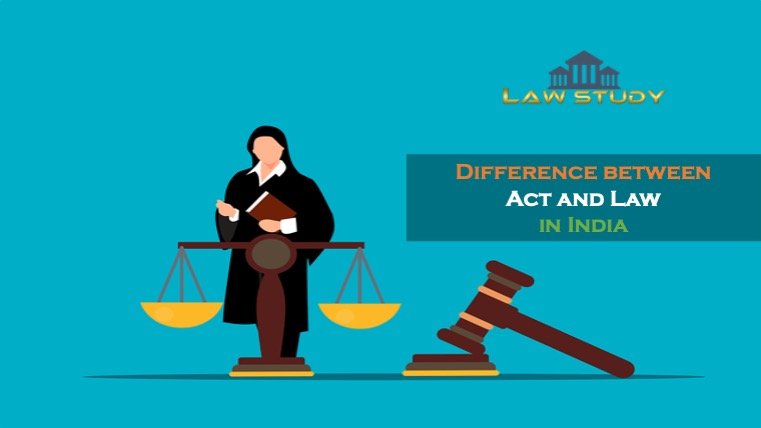Act and law are so similar that they are frequently used interchangeably. Law is a collection of norms & rules that the government implements, whereas an act is a piece of legislation established by the legislature.
Act and Law
The definition of a law is a set of rules that must be complied with. A law that is enacted by the respective legislature, such as a state’s legislative assembly or India’s parliament, is known as an act. Acts are a subdivision of the law.
The rule of law ensures that people follow the recognized guidelines and norms. A law or an act be used to establish rules and regulations in a particular area. for instance, The development company and corporate operations in India, are governed under the Indian Companies Act, 1956.
The fundamental nature of legal processes is more generic, so it’s not as complicated to understand. Regulatory actions have demonstrated that the law can be implemented. Acts are conditional and specialized depending on the aspects in which they have been executed. An Act is symbolized by the bill that it was part of, and it won’t become a law until it is actually enacted.
Definition of the Act
An act is a legal phrase that refers to statutes that have been enacted by parliament. Initially, it is a bill and, when enacted by both houses via a specified procedure, becomes an act. Act either introduces new legislation or amends an existing one. An act emphasizes a specific subject and contains several provisions concerning it.
An object of the act
To make people aware of the policies and guidelines regarding particular circumstances.
Definition of the Law
The definition of law is that it is a body of formal guidelines established and implemented by the government. Its objectives include regulating how the nation’s residents act, safeguarding their legal rights, and ensuring that everyone is treated equally. It establishes obligations and rights for all society’s members.
Every country has a distinct legal system that distinguishes it from other countries. These ideas, however, are universally acknowledged and legally enforceable. The nation’s legal system is developing laws that are intended to be adhered to by all in order to enforce justice in every circumstance. Lawbreaking or disobeying the law are subject to fines, punishments, and sometimes even prison sentences.
An object of the law
To preserve public order and protect citizens from unlawful actions.
Key Distinctions Between Act and Law
The following points can help you better understand the distinction between an act and a law: –
- Acts are laws established by the legislature that focus on a specific matter and include provisions pertaining to it. Law is defined as the principles and norms established by the designated authority and intended to control how members of society conduct themselves.
- All rules and regulations enacted by the government at any time are covered by the law, which is generic in nature. On the other hand, the act is specific because it only applies to a particular circumstance. For example, the Contract Act covers all contract-related provisions, the Partnership Act covers laws relating to partnerships, etc
- Law is a well-established phenomenon, whereas an act is first introduced as a bill in the legislature and becomes an act when it is approved by both houses, the Lok Sabha and the Rajya Sabha, as well as the President.
- An act is descriptive in the sense that it describes why & how laws should be enforced. Law, on the other hand, specifies what should & should not be done in every specific circumstance.
- The purpose of law enforcement is to safeguard people from unfair practices and to maintain peace and order. In contrast, the primary reason for the formation of the act is to inform individuals about the rules and regulations that apply to certain situations.
Conclusion
What would occur in the event if there was no legislation or act against any crime or offense? People will act whatever they like, causing complete chaos and danger, as they have no fear of retribution or punishment. Laws & acts are essential for the framework and efficient operation of the nation’s government. These facilitate the establishment of a harmonious society as well as the just and equitable resolution of individual disputes.
Frequently Asked Questions
Q. What are the different kinds of law?
Ans. There are four forms in the Indian legal system: Statutory law, Common law, Civil law, and Criminal law
Q. What is the significance of the law & the act?
Ans. Both an Act and a Law are critical for the proper operating & organization of society’s and the country’s administration.
Q. Which comes first, the law or the act?
Ans. An Act is more particular than a law, which is more general. A bill is an Act, but the law is a well-established phenomenon. The act comes before the law. There is no Act or Rule if there is no legislation.

























